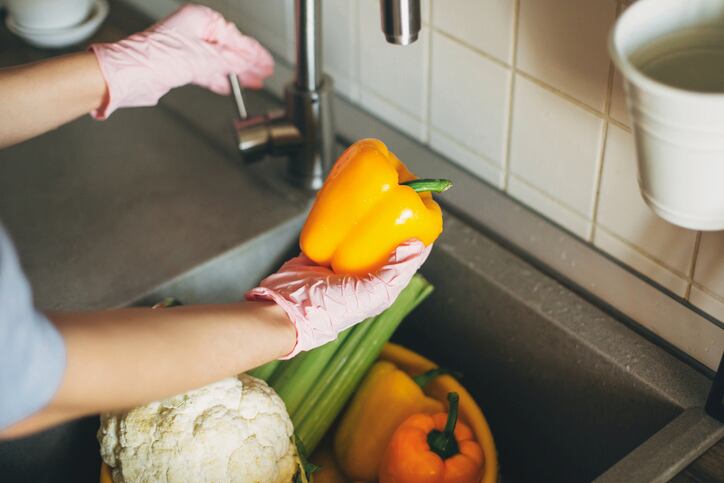According to Philippines President Rodrigo Duterte’s Presidential Spokesperson Harry Roque, about half of the Filipino population experiences hunger and food insecurity – a situation which has been exacerbated over the past year by COVID-19 lockdowns and economic difficulties.
“It’s the state’s obligation to ensure all Filipinos have sufficient food, [thus] we need a new [food security] strategy in place as COVID-19 has completely changed our daily lives,” Roque said in a formal press statement.
“To this end, the president is currently studying the proposal made to place the entire Philippines under the Modified General Community Quarantine (MGCQ) from March 1 to address rises in hunger [from] food insecurity and poverty.”
MGCQ is the most relaxed form of lockdown in the Philippines where physical workplace presence is allowed for non-high-risk employees, all public places can operate at 50% capacity, and public transport can also operate at as high capacity as social distancing controls allow.
If approved, this would mainly mean changes for the country’s major urban cities and areas like Manila and Davao – which are also localities contributing the most COVID-19 case numbers.
“The National Economic and Development Authority (NEDA) has conducted a study which found prolonged lockdowns [will cause] 23.7 million more people to go hungry, 4.5 million more to fall into poverty,” said Roque.
Apart from loosening lockdowns to revive the economy, Duterte has also issued orders for food product profiteers, whether these be cartels or individuals, to be arrested and punished.
These orders were signed off in a Cabinet meeting earlier this month, where the Department of Agriculture (DA) and the Department of Trade and Industry (DTI) will create and lead a sub-Task Group on Economic Intelligence to ‘go after’ smugglers, profiteers and hoarders of food products.
In addition, the National Bureau of Investigation (NBI) has also been directed to investigate ‘groups or individuals’ suspected of cartel activity or price manipulation, particularly for pork which prices skyrocketed to some PHP320 (US$6.61) per kg (as high as PHP450 / US$9.30 in Metro Manila) this year as compared to an average of PHP200 (US$4.13) in 2020 due to shortages.
The order was issued via Justice Secretary Menardo Guevarra, granted authority to NBI to ‘investigate and build up a case’.
“[If evidence is found, charges will be filed] specifically on the existence and operation of certain groups allegedly manipulating the supply and price of pork and other basic foodstuff,” said Guevarra when issuing the order (Department Order No. 029). Offences will be considered violations of the Philippines Price Act and punished accordingly.
Philippines’ pork supply was heavily hit by African Swine Fever (ASF) in 2020, with over 300,000 pigs culled due to the disease, making up some 3% of the population according to government numbers; as well as import and demand issues brought on by the pandemic.
Other measures to tackle pork shortage
Earlier this month, the DA also implemented price ceilings for pork in Metro Manila, where price rises were the most dramatic, in an effort to curb these continuous rises after Duterte signed Executive Order (EO) 124 to enforce this.
The aim is to cut pork prices by at least a third in order to enable the long-suffering public to buy these, and set the prices for pork (pigue, leg cut) at PHP270 (US$5.58) per kg and pork belly at PHP300 (US$6.20) per kg. Chicken prices were also capped at PHP160 per kg.
The price ceiling is expected to be in place until at least April 8, and the DA is also working to triple pork imports for the year to raise local supply.
“We are studying tripling the minimum access volume of meat import allocation, from 54,000MT to 162,000MT this year,” DA Secretary William Dar told the House committees on Agriculture and Food, and Trade and Industry in a high-level meeting.
Not a long-term solution
Despite all of these plans, there is still dissent in Duterte’s cabinet regarding the efficacy of these measures, particularly in the long term, and calls for more resources to be focused on the local pork industry instead.
“While the current food price crisis demands immediate action, we must not ignore the fact that this is merely a symptom of our structural vulnerabilities. As such, our actions must always have a view towards the structural and the long-term,” Albay District Representative Joey Salceda said at the same high-level meeting.
“[We need to build a support system] to make the Philippines pork industry competitive, and not just solve these deficiencies [short-term] via importation - This will include modernising logistics, post-harvest facilities, support for input production such as feeds, and more efficient value-chains.”
Salceda also stressed the need for fast action in these areas, as without solving the core issues, the problem is likely to ‘become worse every year’.
“[Our] population is growing by 1% to 2% percent every year, [and] with COVID-19, we expect a baby boom [with] more mouths to feed,” he said.
“[Rising] affluence also brings more demand for food, [so] as we grow from a lower-middle-income to an upper-middle-income economy, our food demand will grow faster than our own population.”
Duterte’s plans to ease lockdown measures also came under fire by other politicians such as Senate Majority Leader Migz Zubiri who urged Duterte to wait for vaccinations to take place before considering such a major move.
“[When] we’ve already vaccinated how many million Filipinos, then maybe we can start with the MGCQ. But I think that’s the safer avenue to take – [Under MGCQ] everyone can go out freely, and you know sometimes we do forget our rules [so it’s] very difficult to control,” he told The Source.





